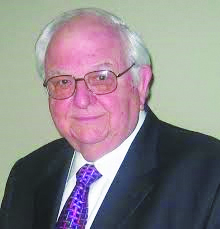By T. F. Tenney
My beloved father-in-law, E. W Caughron, was a patriarch of the faith. He died at the age of 96, having built churches from Texas to Alaska, serving as a home missionary, foreign missionary, and district official. In 1947, Brother Caughron, as a member of the Louisiana District Board, served on the “search committee” appointed by then District Superintendent S. L. Wise, that located and purchased the campground property. At the time of his death, he was the last living member of that early District Board which had directed the affairs of the campground at the time of the campground purchase.
He had a unique way of covering everything, in order to miss nothing on a subject. When he got through with a sermon thought—or in private conversation—to assure that he had touched every base, he would add, “and all such like as that. . . .” It was an umbrella that covered anything he might have left out on the subject at hand.
If it was evangelism and outreach, he would admonish you to witness on the job, bring someone to church, teach a home Bible study, knock on doors—and then add, “and all such like as that….”
During one of his hospital confinements, I went to visit him and took a young preacher with me. After the visit and prayer, I said, “Paw, have you got anything you’d like to tell this young fella?” He looked up from the bed and said, “Yea, one thing. Don’t compromise.” He went on to say, “I know it is a different day and things are not like it was when I started, but I see some trends I don’t like. Hold to the truth.” Of course, he then could well have added “and all such like as that….”
It was good advice. Never compromise your principles.
I’ll tell you another thing that worries me. It’s these erstwhile Christians who climb on their self-made thrones and judge everybody else. Do you remember the woman caught in adultery? She was married. When she went home, how was she received? It wasn’t her brother and sister’s responsibility to judge her. It was her God and her husband’s responsibility. Why do we take it upon ourselves to play God? There may be something about this situation God knows that I don’t know. Does my brother have to explain his every action to me? Are any of us perfect? If we can’t keep ourselves straight, why are we always on our brother’s case?
In Luke 5, Peter said to the Lord, “Depart from me; for I am a sinful man.” The Living Bible translates it, “I’m too much of a sinner for you to have around.” Boiled to its essence, if it weren’t for grace, none of us are good enough for God to be around. As one man observed after Peter’s failure, God used a barnyard animal to underline the failure—the cock crowed. You know what Jesus did? He reached down and restored Peter—even after Peter denied him and ran away. We need to love our brother redemptively . . . and all such like as that.
Ezekiel said, “I sat where they sat.” Why don’t you put yourself in your brother’s shoes—or pulpit—before you judge him too harshly? David made a lot of mistakes yet he was a man after God’s own heart. I believe the reason for that was he was sensitive to the things that made a difference to God. I don’t care how small they were—if it was following a ewe great with young or forgiving a Joab who had betrayed him three times. There was something bottom line in David that attracted God.
Some people have the Shimei spirit. Shimei followed David in his exodus from Jerusalem. David was fleeing the rebellion of Absalom. David’s theory was, “I would rather leave Jerusalem, and accept the wrong done to me, than to see the city destroyed and torn apart in battle.” I wish more of us thought that highly of the work above our own ego. Here comes Shimei cursing the king and throwing dirt. David’s men wanted to kill him but David said, “No, I’m going to embrace this as the correction of God. Maybe God will bless me for it.” He did not retaliate.
There will always be those with the Shimei spirit, throwing dirt at leadership—criticizing—joining the crowd—falling like vultures on a man when he’s down. David simply said, “The Lord will take care of him,” and He did. Many years later, Solomon drew a line and said, “Don’t cross this line.” Shimei crossed it. Shimei died. God always evens the score. You may be embracing something right now that is of the spirit of Shimei—criticizing leadership, second-guessing you, analyzing and re-analyzing something that was written about you. Accept it—embrace it—and remember, God will even the score . . . and all such like as that!
I can’t understand some men. There are brothers among us who have preached honorably for years, declared the whole counsel of God, lived godly lives. We have known them, examined them, loved them, worked with them. One little statement can be made (a statement even not fully clarified nor understood) and we are quick to jump on it, accept it without knowing the background or the context. We draw our swords, get on our fax machines, activate our e-mail, sign up for text messaging, and increase the coffers of AT&T without ever inquiring of our brother, or those who are knowledgeable, as to the validity of the claim. You know, there could be an explanation. Is this New Testament Christianity? “. . . And all like as that!”
There are some men who want an arena. If they can’t get in the positive arena with church growth, revival, outreach, a passion for souls, then they are going to get in the critic’s corner. They are going to be the champions of the champions, with a Messiah complex. They must think some of us are “Ned and the First Reader” and can’t see through it. You better put your agenda on the top, wash it in the blood of Jesus, and ask the question, “Will this glorify Christ?” Above all, I want to be committed to walk in integrity with God and my brothers. Again, let me tell you, my reputation should be the safest in your hands. I don’t need to start out on this, “Have you heard” or “Did you read” “Gashmu saith it” and “Well, I figured that’s what he was all the time” parade. I learned long ago—you only throw sticks and stones at fruit-bearing trees unless you are a Shimei—and then you wait until the victim is well out of the city limits, test the wind to make sure there’s enough against him, then pick up your stones. It must feel good to be in that elite club. (I wouldn’t know)
Why is it we get the magnifying glass out on some fellow believers—and for others we take off our own glasses so we can’t see their faults and inconsistencies through our jaundiced eyes? I’ve known of men to scream, want letters written, want affirmation and reaffirmation concerning the beliefs of a brother who is known to be faithful for many years. Then, check the repertoire of these self-enthroned spiritual Caesars who want you to sniff their salt and call them Lord. Look at their friends. Some of them look like “who’s who” of the rogue’s gallery. Some are suspected of multiple immorality; others are free as a breeze, loose as the proverbial goose, and always will be. By free, I mean undisciplined individuals who are accountable to nobody. Yet because they preach a certain brand they are quite acceptable. They may have attacked and re-attacked every organization and denomination imaginable—even true apostolic believers—and never apologized—but that’s all right. Their past may not be very credible. They may have allowed one mud-slinging contest after another from their pulpit. That’s fine, as long as you follow my particular line. But I’ve got Article VII, Section 4, Paragraph iii against my brother who is in my organization and I can use that—and abuse that—but I’ll fellowship you even though I can’t speak into your life or call you to accountability. Incidentally, while speaking of the blessed old Manual—I didn’t write Article VII. I don’t know that I even agree with everything in it, especially its methodology. Then, why is it there? Conferences put it there. Conferences elect officials. You expect it to be enforced—until it’s your friend, or some particular incident that’s “different.” Please remember, Paul said in I Timothy 5:21 in Living Letters, “Treat all men the same even if he’s a special friend.” Is the Bible to be interpreted in a special way if a man is your friend? If you have that kind of leadership, they’re not worth their salt . . . and all such like as that. Oh, all they have to say is, “God said. . . . The Lord spoke . . . It’s the will of God. . . .”—I can appreciate that. But, on the other hand, is there not “wisdom in a multitude of counsel”? What does the word submission mean? Isn’t there a scripture somewhere that speaks of those who have authority or rule over you? What are you going to do when the opinion of the conglomerate of brothers, with maybe a thousand years of ministerial experience, says one thing—and your judgment or the judgment of your friends says another? . . . And all such like as that.
If you are going to have a real move of God and the operation of the gifts of the Spirit, it is going to require cleaning up a mess every now and then. Why do you think I Corinthians was written? Paul had to clean up a mess! Solomon said, “You have a clean stall if you don’t have an ox in it.” But if you’ve got an ox, you’ve got power! If you are going to have the power of the ox, you are going to have to clean up his mess every now and then.
If you don’t want to be criticized, let me tell you again—Don’t ever do anything, don’t ever have anything, don’t ever say anything, and don’t ever be anything. You’ll just be a good little brother. But if you want to stir hell and even some of your so-called brothers, you do something nobody else is doing—have something nobody else has—be something nobody else is being—just let your church get on a good revival growth spiritually—and the termites will come out, build their dark tunnels and start trying to eat up your insides. Yes, you’ll always have to put up with the ankle bites of lesser men when you succeed in the kingdom. Yes, you may have to clean up a mess every now and then. But, a mess is better than doing nothing and all such like as that.
It may be that God’s through with you where you are. But there should not be a divorce between the Word and the Spirit. Sometimes we say, “Well, I’m planted in such a little place.” Do you understand that revival began in a manger? Was that a little place? Wiersbe said, “If God wants you to leave, He has a place for you. If God wants you to stay, He has the grace for you . . .” and all such like as that.
No, my brethren, this is not a normal time. It’s fighting time! Put on “the whole armour of God” and then “pray without ceasing.” Remember, the best tools receive their temper from fire. A diamond is nothing but a lump of coal that stuck to it—and only its own dust is hard enough to make this precious stone reveal its beauty. There is only one failure, and that is not to be true to the best that’s in us.
The story of Roger Reynolds comes to mind. In 1974 he was with the world-renowned Golden Knights parachute team of Charlottesville, Virginia. He was on his 959th jump. He had two chutes—one main and one emergency. At 2800 feet, chute number one failed; 202 feet later number two chute failed. He landed in a doctor’s front yard with a terrible thud and no chute. His lights went out. The doctor happened to be there and rushed out. Roger’s leg swelled like a watermelon. His foot was pointing backward. His anklebone was sticking out. His left heel was smashed. In addition to this, he had an open compound fracture on the shin bone. He had torn cartilages in his knees. His hip was cracked; his pelvis was cracked; his tailbone was broken. He had three broken ribs, a broken wrist, a broken forearm, a broken upper arm, a dislocated shoulder, and concussions.
Roger was flat on his back for five months. He fainted the first time they sat him in a wheelchair. He fainted the first time on the parallel bars. But he kept sneaking into the gym to train even when they told him not to. In August 1975, Roger was released. He jumped again. He trained for two years and in 1978 ran and finished the twenty-mile Boston Marathon. He refused to give up. That’s the bottom line. Perseverance . . . and all such like as that.
The above article, “All Such Like As That” was written by T. F. Tenney. The article was excerpted from chapter 4 of Tenney’s book, The Lord Said…Or Was That Me?
The material is copyrighted and should not be reprinted under any other name or author. However, this material may be freely used for personal study or research purposes.





1 thought on “All Such Like As That (Entire Article)”